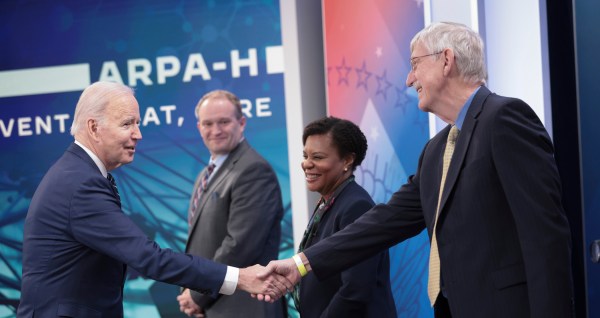New ONC chief looks to slash document burden for small medical practices

Three months after the Trump administration tapped Donald Rucker to be its National Coordinator for Health Information Technology, the new ONC chief sat down Tuesday to outline the future of health information technology policy.
While ONC’s goal of making electronic health records interoperable remains, former Siemens Chief Medical Officer Rucker and new Deputy Assistant Secretary for Health Technology Reform Dr. John Fleming — the former Louisiana congressman — made it clear that reducing the documentation burden for small practice medical providers will be a key focus of the office.
“I would say in my entire experience in the government over the decades — I’m sure you’ll find a counter-example — but I believe this is the first time that at the highest levels of [the Department of Health and Human Services] that we’ve had somebody to represent the very small practices,” Rucker said of Fleming, a former small practice physician.
“The large practices we all know,” he said. “I think this is the first time we’ve had an explicit call out to somebody who’s had a lifetime of small practice experience as we go about the whole business of HHS.”
New HHS Secretary Tom Price also spoke of this burden at the recent Health Datapalooza in April, saying “we simply have to do a better job of reducing the burden of health IT on physicians and all health care providers.”
“The promise of big data and health IT is so great, absolutely remarkable. But we must not, cannot continue to get this wrong with the sense that sometimes comes out of this town, and that is a one-size-fits-all, inflexible system for our nation’s physicians and patients simply will not work,” Price said then.
ONC’s focus on reducing the documentation burden for small practice doctors is part of a strategy to make EHR use more palatable for a sliver of the health care sector that doesn’t typically have the resources to navigate the tangled jungle of information requirements, often eliciting sensory overload, the officials said.
“We hear more and more complaints from doctors and patients as to the inability for the doctor to focus 100 percent on the patient’s problems,” Fleming said.
He added that ONC would be examining ways to streamline EHRs, including paring down what he called “voluminous” health notes, to make the records more readable and functional, which could also improve health care costs.
“Under the current fee-for-service methodology, doctors are paid for documentation, not necessarily for their level of care,” he said.
Fleming similarly urged for a “single, unified electronic health record system” in June.
Rucker added that he and his team are looking at ONC regulations and collaborating with the Centers for Medicare and Medicaid Services to examine the quality framework around value-based purchasing
“For a lot of practices, this has become a challenge,” he said. “We just have to think about what’s the win? At some point, the expense of complying with the quality measures is a much greater expense of the innate value of the quality measures.”
ONC will also attempt to finish the guidance for the 21st Century Cures Act, which requires the office to tackle issues ranging from establishing a Health IT Advisory Committee and outlining interoperability standards to defining how information blocking inhibits interoperability efforts, among others.
But that’s only if Congress passes a budget come September.
“Some of this we are not actually legally able to work on until Congress starts its handling of the budget,” Rucker said.






